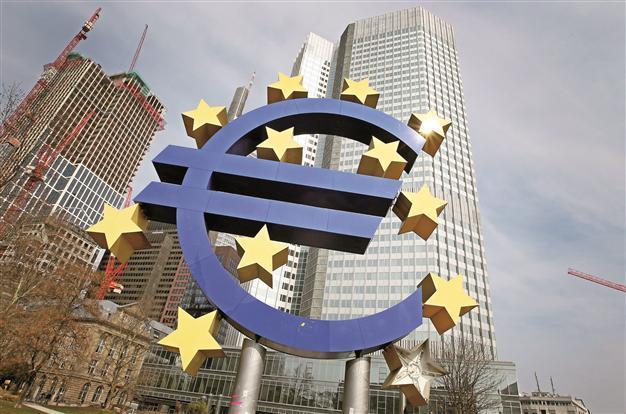European Central Bank official plays down rate cut speculation
FRANKFURT/BRUSSELS

European Central Bank Executive Board member Joerg Asmussen urges governments to push on with budget consolidation and reforms. AFP photo
European Central Bank (ECB) Executive Board member played down growing expectations of a looming cut in eurozone interest rates, saying that such a move should not be seen as a cure-all for the region’s debt crisis.“Monetary policy is not an all-purpose weapon for any kind of economic illness,” Joerg Asmussen told a conference in London in comments made available by the central bank.
There is growing speculation the ECB could lower its key interest rate - already at all-time low of 0.75 percent - in the coming months as the nascent recovery in the 17 economies that make up the euro already appears to be stalling.
However, German Chancellor Angela Merkel said the ECB would have to raise interest rates if it were looking at Germany alone but it is in a difficult position because of the economic divergence in the currency bloc.
Arguments for such a move received a boost on April 14 when data showed that business confidence in Germany, which has managed to escape relatively unscathed from the recession plaguing most of its neighbours, has taken a knock. But Asmussen argued that the countries that would benefit most from even lower rates would not necessarily feel the effect of additional monetary easing.
“Due to impaired monetary policy transmission, the pass-through of rate cuts to the periphery would be limited, and this is where they are most needed,” Asmussen argued. “At the same time, rate cuts would further relax already unprecedentedly easy financing conditions in the core. This is not per se a problem - but interest rates that are too low for too long can eventually lead to distortions,” the ECB official argued.
Excessively low interest rates could lead to a misallocation of resources, excessive capital inflows into a number of emerging economies with exchange rate effects and credit risks, and it would reduce incentives for governments, banks, and corporates to adjust, Asmussen said.
“These costs of very low interest rates are real, and they rise over time. Of course, these costs have to be weighed against the need for exceptional monetary policy measures in a crisis,” Asmussen continued. He insisted there were limits to what monetary policy could achieve. “The ECB can and has addressed bank funding problems,” via pumping unprecedented amounts of liquidity into the system via its so-called LTROs, or long term refinancing operations, Asmussen said.
Delaying austerity is ‘no easy way out’
Asmussen urged governments on April 24 to push on with budget consolidation and reforms, saying there are no alternatives to those measures.
Doubts over the effectiveness of setting hard targets for reducing national debt have emerged in light of a sluggish global recovery. ECB Vice-President Vitor Constancio said that seeking to stimulate economies by stopping measures aimed at cutting government debt could merely increase countries’ borrowing costs rather than triggering growth. On April 22, European Commission President Jose Manuel Barroso said austerity had reached its natural limits of popular support.
Asmussen rejected such notions and said there was no way around “painful” rebalancing in the eurozone and added that the ECB had already done a lot and could not do more.
“Delaying fiscal consolidation is not an easy way out - if it were, we would have taken it,” Asmussen said. “Delaying fiscal consolidation is no free lunch. It means higher debt levels. And this has real costs in the euro area where public debts are already very high,” he added.
Compiled from Agence France-Presse and Reuters stories by the Daily News staff.
















